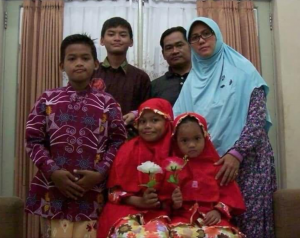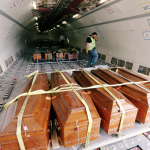By The New York Times –
One suicide bomber appeared to have been disguised as a churchgoer. Another drove a Toyota minivan with a bomb to one attack site. Still another was seen in footage speeding on a scooter toward a church before an explosion.

After the back-to-back bombings that targeted three churches in Surabaya, Indonesia’s second-largest city, as worshipers gathered between services on Sunday morning, the police said they had been the work of one family: a couple who had led their four children on a terror spree that took their own lives and those of at least seven other people.
The Islamic State claimed responsibility for the attacks, according to the group’s news agency, Amaq. In an initial bulletin, the group described each of the bombings as a “martyrdom” operation. In a subsequent, longer media release, the Islamic State identified three modes of attack: a car bomb, a suicide vest and a motorcycle-borne bomb.
On Monday, there was increasing evidence that the church bombers were not alone. The police now say that there have been at least two more bomb blasts beyond the assaults on the churches, as well as a trove of completed bombs found in a separate housing complex.
In the suburb of Sidoarjo, south of Surabaya in East Java, a bomb detonated within a family’s apartment as the police closed in on Sunday night, killing the husband and wife and one of their children, and injuring another three children, said a spokesman for the provincial police, Frans Barung Mangera. He identified the killed suspect as Anton Ferdiantono, 46, who police officials later said was a friend of the man behind the church bombings.
And in a new attack, on Monday morning, a team of bombers on two motorcycles detonated explosives at a checkpoint outside the city police headquarters in Surabaya.
Mr. Frans, the police spokesman, said that four of the five people on the motorcycles were killed, and that the fifth, an 8-year-old girl, had been taken to the hospital. Four police officers were reported injured. A video released by an Indonesian news outlet appeared to show the explosion centered on one of the motorcycles, flattening police officers and the other motorcycle, and damaging a car beside it.
The counterterrorism police said they raided another housing complex in Sidoarjo on Monday morning, recovering several completed bombs after having neighboring residents evacuate.
Sunday’s church bombings occurred one day after a man in Paris who shouted, “God is great” in Arabic killed one person with a knife and wounded four others. The Islamic State claimed responsibility for that attack. A day later, the group’s news agency released a cellphone video of the attacker pledging allegiance to the Islamic State and calling on fellow Islamic State supporters in France, Germany, the United Kingdom and elsewhere too carry out attacks.
At least 43 other people were wounded in the church bombings, Mr. Frans said. He added that the bombs had been detonated in different parts of the city within minutes of one another. The victims included two police officers and worshipers who were entering and leaving the churches between services, he added.
At a news conference later on Sunday, Indonesia’s police chief, Tito Karnavian, said the family suspected in the attacks had recently returned from Syria: “Five hundred people were deported from Syria; among them is this family.”
He identified the attackers as Dita Oepriarto and his wife, Puji Kuswati. The police chief said that two of their sons, ages 18 and 16, had also been involved. Two younger children were also seen in the company of the woman at one bombing site, the police said.
Footage posted on YouTube shows what appears to be one of the attackers on a scooter suddenly turning off a street and heading toward a church before a bomb goes off.
The police said the father, driving a Toyota minivan, had dropped off the mother and two children, ages 12 and 9, at the Indonesia Christian Church. There, according to Kumparan News, an online news site that quoted the deputy police chief of Surabaya, the woman tried to force her way into the church after being stopped by a security guard.
She then detonated the bomb in the yard outside the entrance, killing herself and the two children, the deputy police chief said.
At another target, Santa Maria Church, the sons detonated the explosives, the police chief said. Photos from the site showed several people lying on the ground outside the church gate. Other images showed scattered debris and the police cordoning off the site.
The father was behind the wheel of the vehicle that crashed into Surabaya Center Pentecostal Church, detonating a bomb believed to have been in the vehicle, the police said. The couple, along with all four children, died in the explosions, the police said.
The police later disabled three bombs at the home of the suspects, officials in Surabaya said.
Surabaya, located on the eastern side of the island of Java, has a significant Christian minority that is about 11 percent of the city’s population of almost three million. The bombings occurred as professed followers of the Islamic State have begun to make their presence felt in Indonesia, a Muslim-majority nation that is proud of its diversity and tolerance.
In 2016, the Islamic State, also known as ISIS, claimed its first attack in Southeast Asia, when militants attacked a police post and shopping center in central Jakarta, the Indonesian capital, with homemade guns and bombs.
This month, inmates who said they were followers of the Islamic State rioted in a high-security detention center outside Jakarta. Five guards were killed before counterterrorism officers stormed the compound.
Churches have also been targeted by other extremists. On Christmas Eve in 2000, nearly simultaneous attacks on churches in Jakarta and several other cities killed about 20 people. A local group with links to Al Qaeda claimed credit.
The suicide bombings here and the knife attack in France came days before the start of the holy month of Ramadan, a time of prayer for the majority of the world’s Muslims and a period when groups like ISIS typically intensify and multiply attacks.
Analysts have been waiting for the start of Ramadan, which begins on Tuesday, to assess the Islamic State’s capabilities. They argue that if the group is able to carry out significant attacks, as it did during Ramadan over the previous three years, it would indicate that the group remained a potent threat, despite its territorial losses.
On Sunday evening, hundreds of people gathered at the Heroes Monument in Surabaya to mourn the bombing victims, and officials announced that public schools in the city would be closed on Monday.
___________________
By Muktita Suhartono and Rukmini Callimachi
Photo: Surabaya Center Pentecostal Church, in East Java, Indonesia, was one of three churches targeted by suicide bombers on Sunday. Credit: Surabaya Government/Antara Foto, via Reuters,




